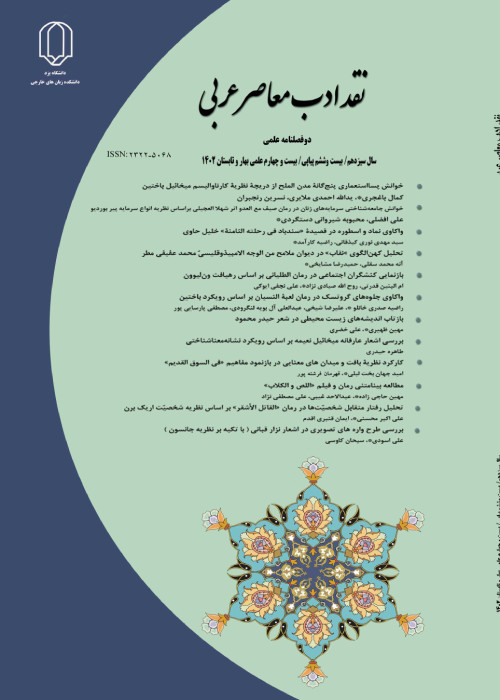The Metafiction analysis of the novel Harb al-Kulb al-Thani
Fiction literature is constantly changing, and various schools have emerged in this field. The novel is the most prominent type of fiction and the product of a new era that has been accompanied by a wide range of progress and innovation in social, cultural and economic fields. Fiction literature evolved under the influence of this multidirectional growth. According to the requirements of each period, various literary schools emerged in the field of fiction. At the beginning of the eighteenth century, due to certain social and cultural conditions, realistic novels gained more attention. They focused on people and issues such as poverty, misery, jealousy and suffering and considered the reality of the matter and observation of accurate details regardless of innovation and imagination. With economic progress, cultural growth, and the emergence of modernism at the beginning of the twentieth century, however, novelists shifted from socialism and simple expression to individualism, attention to man himself and his mind, and complex and difficult language. Therefore, the writers of modern novels abandoned the common traditional language because they saw pleasure in unconventional expressions. After the world wars and the growth of population as well as the complexity of man’s life, modernist ideas became monotonous. So, with the advent of postmodernism and the requirements of the new age, a revision of modernist thoughts and lifestyles became necessary, and postmodern writers creativel started writing new works with different plots, narrative styles and writing techniques against normative rules. Meta-fiction is a type of postmodern story that is very different from pre-modern novels. Its most important feature is a conscious acknowledgment of the fabrication of the story. The postmodern current gradually entered the Arabic language and literature, and many Arab novelists such as Najib Mahfouz, Zakaria Tamer, Amjad Nasser and Majid Tobia turned to this new style of storytelling and wrote original postmodern works. Ibrahim Nasrallah, a well-known Jordanian writer with a Palestinian origin, is one of the authors whose postmodern background is evident in some of his works, such as "Barari al-Hammi", "The Child of Al-Muhamah" and the novel Harb al-Kalb al-Thani. This novel won the Arab Booker Prize in 2018 as a work that has fantasy and imaginative themes and narrates a full-fledged world war known as the Second Dog War. This article seeks to examine the storytelling technique of Ibrahim Nasrallah in this novel, to criticize its meta-fiction features, and to explore the purpose of using this storytelling technique.
This study is done in a descriptive and analytical manner based on library references. First, by enumerating the features of meta-fictions and explaining the structure of such novels, some meta-fictional features in the novel Harb al-Kalb al-Thani are examined. As a definition for meta-fiction novels, meta-fictions, unlike pre-modern novels that tried to depict the external and real world, do not reflect the real world. In fact, they consciously draw the reader's attention to their artificiality. Exposing industry and mocking precautions of fiction are the most important features of meta-fictions, which raises ontological questions about the relationship between the world of the text and the world outside the text (i.e., the worlds of the writer and the reader) (Waugh, 1996: 4).
The results of the novel analysis are as follows: - The novel Harb al-Kalb al-Thani is a genuine meta-story that has the main components of a meta-fiction. - The author has used meta-fiction techniques of short connection, multiple ending and printed and written playfulness to connect the text and the reality. He has also created a short connection in this novel by entering the text, assigning a role to the audience, using literary criticism terms and referring to the method of storytelling. - The author of the novel shows the reader that the novel has been made using meta-fictional techniques and reminds him/her that he/she is studying a pure story. The events of the story and the characters are imaginary and do not exist in the real world. - By entering himself and the reader to the story, the author denies the god-like authority of himself. Also, by creating a free ending, he has culminated the uncertainty that is visible in the whole structure of the novel, giving the reader the ability to make many different interpretations and to contribute to the creation of the story. The author emphasizes the novel's visual and physical dimension and the storytelling in general through printed and written playfulness in the text. He shows that the novel is a collection of printed words; the words and characters that flow from his mind. With this narrative style, he puts his audience between imagination and reality, hegemony and extravagance. He depicts the destructive competitive sense of humanity in the 21st century. By avoiding mere realism, he conveys his messages in the text of the novel in such a way as to challenge the reader's mind.
- حق عضویت دریافتی صرف حمایت از نشریات عضو و نگهداری، تکمیل و توسعه مگیران میشود.
- پرداخت حق اشتراک و دانلود مقالات اجازه بازنشر آن در سایر رسانههای چاپی و دیجیتال را به کاربر نمیدهد.



